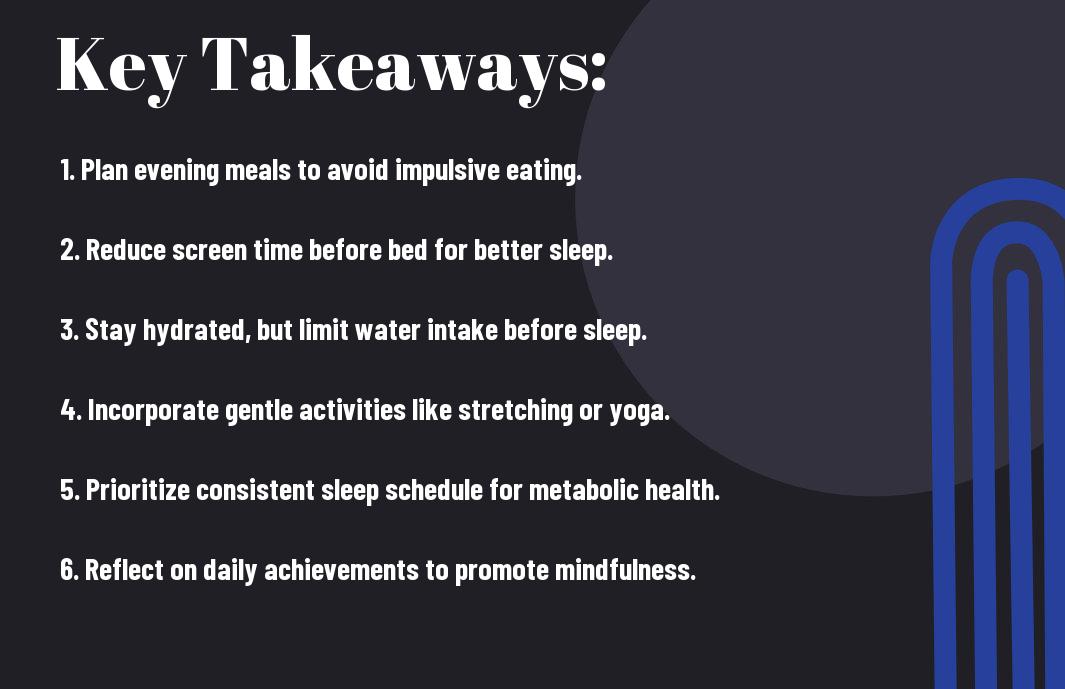Weight loss involves more than just diet and exercise; it also hinges on your evening habits. By adopting an optimal evening routine, you can enhance your metabolic processes, boost your sleep quality, and set yourself up for success the following day. This guide will explore effective strategies to incorporate into your evenings, help you wind down mindfully, and contribute to your weight loss goals while improving your overall well-being. Discover how simple adjustments in your nightly routine can lead to lasting results.

Key Takeaways:
- Consistent Sleep Schedule: Establish a regular bedtime to improve sleep quality, which aids in weight loss.
- Limit Screen Time: Reduce exposure to screens at least an hour before bed to enhance melatonin production and promote better sleep.
- Evening Hydration: Drink water mindfully in the evening but avoid excessive fluid intake right before sleeping to prevent nighttime awakenings.
- Healthy Snacks: Choose nutrient-dense snacks if hungry, focusing on proteins and healthy fats to prevent nighttime cravings.
- Mindful Relaxation: Engage in relaxation techniques like meditation or reading to lower stress levels, which can positively impact metabolism.
- Plan for Tomorrow: Prepare meals and workout sessions for the next day to stay organized and maintain healthy habits.
- Avoid Heavy Meals: Opt for lighter dinners to prevent discomfort and promote better digestion before bedtime.

Importance of an Evening Routine for Weight Loss
To achieve lasting weight loss, establishing a consistent evening routine is important. It helps you unwind and prepare your body and mind for a restful night, which is vital for regulating hormones, recovery, and overall health. By prioritizing your evening ritual, you foster healthy habits that support your weight loss journey and improve your overall well-being.
Impact on Metabolism
Loss of structure in your evening routine can negatively affect your metabolism, hindering your weight loss efforts. Engaging in healthy activities in the evening, like a light workout or meal prepping, can improve your metabolism and encourage more efficient calorie burning while you sleep.
Psychological Benefits
Metabolism isn’t the only factor at play when it comes to weight loss; your mindset matters too. Cultivating a positive evening routine can enhance your psychological resilience, reduce stress, and encourage mindful eating. It’s important to remember that a rich inner world combined with physical efforts can lead to more sustainable weight loss outcomes.
Due to the pressure of daily life, many people struggle with maintaining motivation and self-discipline, impacting their weight loss journey. By implementing calming activities, such as journaling or meditation in your evening routine, you create a space for reflection and goal-setting. This mindfulness helps you stay focused and committed to your weight loss objectives, promoting healthier lifestyle choices during the following day.

Components of an Optimal Evening Routine
The key elements of an optimal evening routine focus on promoting relaxation, healthy eating, and mindful assessment of your day. Incorporating habits such as minimizing exposure to screens, practicing mindfulness, and establishing a consistent bedtime can significantly enhance your weight loss journey. For more details, check out these 6 Bedtime Habits That Will Help You Lose Weight.
Healthy Dinner Choices
About your dinner selection, prioritizing whole foods like lean proteins, vegetables, and healthy fats can aid in weight loss. Integrating nutrient-dense ingredients ensures that you are satisfied while providing your body with vital nutrients. Paying attention to what you eat in the evening can largely influence your overall progress.
Portion Control Strategies
Components of effective portion control include mindful eating practices that help regulate your intake. Paying attention to your body’s hunger signals, utilizing smaller plates, and pre-portioned meals can contribute to better control over calorie consumption.
And as you develop portion control strategies, consider keeping a food diary to track your meals. This allows you to identify patterns and adjust your serving sizes accordingly. Additionally, take your time while eating; savoring each bite can enhance satisfaction and help prevent overeating. Implementing these strategies fosters a healthier relationship with food and supports your weight loss goals.
Incorporating Physical Activity
Your evening routine should include physical activity that aligns with your weight loss goals. Engaging in exercise after work can boost metabolism and help you unwind from the stresses of the day. Aim for at least 30 minutes of moderate-intensity exercise, such as jogging, cycling, or a home workout, to maximize your results. Make it enjoyable by incorporating activities you love, as this will help you stay consistent and committed to your routine.
Evening Workouts vs. Morning Workouts
For those contemplating the best time to exercise, evening workouts may provide more time to focus on your fitness goals. You can typically engage more fully in your workouts after a day of fueling your body, and it can serve as a great way to decompress. However, morning workouts can also energize you for the day ahead. It’s crucial to choose what feels best for you.
Finding the Right Fit for Your Schedule
At times, fitting workouts into your daily schedule can be challenging. Prioritize establishing a routine that works within your unique time constraints while still allowing you to exercise regularly.
For instance, if you find mornings too hectic, consider slotting in quick workouts after dinner or even using weekends for longer sessions. Identify specific days where you can dedicate time to exercise and plan ahead, ensuring you have no distractions. With some strategic planning, you can seamlessly incorporate physical activity into your evening routine, making it a sustainable habit in your weight loss journey.
Establishing a Wind-Down Ritual
Keep your evenings relaxing and restorative by establishing a consistent wind-down ritual. This practice signals to your body that it’s time to shift from the hustle of the day to a calming state, helping to optimize your weight loss efforts. Engaging in soothing activities such as reading, stretching, or meditating prepares your mind and body for restful sleep, setting the stage for better recovery and appetite regulation.
Relaxation Techniques
Along with a wind-down ritual, incorporating relaxation techniques like deep breathing, progressive muscle relaxation, or gentle yoga can enhance your evening routine. These practices not only alleviate stress but also promote mindfulness, which can support healthier food choices and emotional stability. Prioritizing relaxation in your evening routine allows you to end the day positively and sets a soothing tone for sleep.
Limiting Screen Time
To promote better sleep quality and support your weight loss journey, aim to limit your screen time in the evening. Reducing exposure to screens helps to lower blue light exposure, which can interfere with melatonin production and disrupt your sleep cycle. Instead, consider engaging in screen-free activities that foster relaxation, such as journaling, art, or enjoying a warm herbal tea.
Understanding the impact of screen time on your sleep health is vital for effective weight loss. The blue light emitted by devices can hinder your ability to fall asleep and reduce sleep quality, making it harder to manage cravings and energy levels the next day. By setting boundaries on daily screen time, you cultivate a more restful environment that encourages better sleep, ultimately aiding your journey towards weight loss and overall well-being.
The Role of Sleep in Weight Loss
Many underestimate the importance of sleep when it comes to weight loss. Quality rest not only aids physical recovery but also helps regulate hormones that control hunger and metabolism. Insufficient sleep can lead to increased cravings and lower energy expenditure, making it significantly harder to achieve desired weight loss goals.
Sleep Quality and Quantity
To maximize your weight loss efforts, both sleep quality and quantity are vital. Aim for 7-9 hours of restorative sleep each night. High-quality sleep contributes to better mental clarity and mood, while inadequate sleep can hinder your ability to make healthy choices throughout the day.
Tips for Better Sleep Hygiene
About establishing a beneficial sleep environment can greatly improve your rest. Here are some tips to enhance your sleep hygiene:
- Maintain a consistent sleep schedule.
- Create a restful atmosphere—dark, cool, and quiet.
- Limit screen time at least an hour before bed.
- Incorporate relaxing bedtime routines.
Knowing how to create a healthy sleep environment will contribute directly to your overall well-being.
Better sleep hygiene also involves small, manageable changes in your daily routine. Consider implementing the following practices to help improve your sleep quality:
- Avoid caffeine in the afternoon and evening.
- Stay hydrated during the day, but limit fluid intake before bed.
- Engage in regular physical activity but avoid intense workouts close to bedtime.
- Consider relaxation techniques such as meditation or deep breathing exercises.
Knowing that small adjustments can lead to significant improvements in sleep can help you stay committed to your weight loss journey.

Common Pitfalls to Avoid
After establishing an evening routine for weight loss, it’s important to be mindful of common pitfalls that can derail your progress. One key barrier is late-night snacking, where you might find yourself mindlessly grazing on unhealthy foods, leading to excess calorie intake. You can explore 15 Evening Routines That Accelerate Weight Loss Overnight to find effective strategies to help you stay on track.
Late-Night Snacking
LateNight snacking can sabotage your weight loss efforts by leading to consuming unnecessary calories. Try to be aware of your cravings and understand if they stem from hunger or habits. Consider substituting unhealthy snacks with healthier options or simply curbing the habit altogether.
Inconsistent Routines
Routines are crucial for sustainable weight loss, and inconsistency can lead to less effective results. A lack of a structured evening routine may leave you vulnerable to poor dietary choices and irregular sleep patterns.
For instance, if you occasionally skip your evening routine, you might find yourself going to bed later or indulging in snacks, which can disrupt your metabolism. Sticking to a consistent schedule not only reinforces healthy habits but also trains your body to recognize when it’s time to wind down, ultimately supporting your weight loss goals.
Final Words
With this in mind, establishing an optimal evening routine can significantly enhance your weight loss journey. By prioritizing activities such as meal prepping, staying hydrated, and ensuring adequate sleep, you set a strong foundation for achieving your health goals. Additionally, incorporating relaxation techniques can help reduce stress, preventing emotional eating. By consistently following your evening routine, you’ll not only support effective weight management but also promote overall well-being in your life.
FAQ
Q: Why is an evening routine important for weight loss?
A: An evening routine helps to establish a consistent schedule, which can promote better sleep, reduce late-night snacking, and create a mindful transition from the day to night. A well-structured routine can encourage healthier habits that support weight loss goals.
Q: What are effective activities to include in an evening routine for weight loss?
A: Effective activities may include light exercise such as stretching or yoga, preparing healthy meals for the next day, engaging in mindful practices like meditation, and setting aside time to unwind without screens. These activities can help in reducing stress and improving overall wellness.
Q: How does sleep impact weight loss?
A: Sleep significantly affects hormone regulation, including those that influence hunger and metabolism. Insufficient sleep can lead to increased appetite and cravings for high-calorie foods, making it more challenging to lose weight. Prioritizing restorative sleep is a key component of any weight loss strategy.
Q: Should I eat before bed if I am trying to lose weight?
A: It is not necessary to avoid eating before bed entirely, but choosing light, healthy snacks can be beneficial. Opt for options rich in protein or fiber that can help manage hunger levels and support your weight loss efforts without consuming excessive calories.
Q: How can I combat nighttime cravings while following an evening routine?
A: Combatting nighttime cravings can be achieved by keeping your mind engaged with activities like reading, journaling, or meditation. Staying hydrated and ensuring that your last meal is balanced can also help curb cravings. If you do feel hungry, consider healthy snack choices like fruits or vegetables.
Q: What is the best time to wind down in the evening?
A: It is recommended to start winding down at least one to two hours before bedtime. This allows your body and mind to relax. Creating a calming environment, whether through dim lighting or soothing music, can aid in the transition from the day’s activities to a restful night’s sleep.
Q: Can I adapt my evening routine based on my schedule?
A: Yes, it is perfectly fine to adapt your evening routine based on your personal schedule. The key is to ensure that it still includes vital elements like relaxation, balanced nutrition, and an adequate sleep schedule, regardless of the specific timing or length of the routine.



